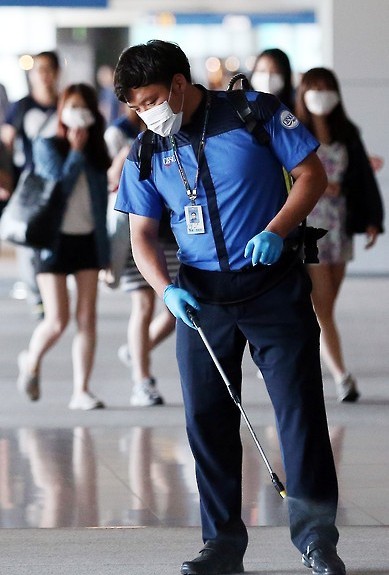- California Assembly OKs highest minimum wage in nation
- S. Korea unveils first graphic cigarette warnings
- US joins with South Korea, Japan in bid to deter North Korea
- LPGA golfer Chun In-gee finally back in action
- S. Korea won’t be top seed in final World Cup qualification round
- US men’s soccer misses 2nd straight Olympics
- US back on track in qualifying with 4-0 win over Guatemala
- High-intensity workout injuries spawn cottage industry
- CDC expands range of Zika mosquitoes into parts of Northeast
- Who knew? ‘The Walking Dead’ is helping families connect
Is S. Korea dealing with mutated MERS?
Minister denies it but evidence points otherwise

A worker sprays anti-septic solution on the arrival lobby of Incheon airport, west of Seoul, June 3, 2015, amid rising public concerns over the spread of the Middle East Respiratory Syndrome. (Yonhap)
By Jung Min-ho
SEOUL — Has the Middle East Respiratory Syndrome (MERS) coronavirus mutated?
The answer greatly affects the way it is handled because, epidemiologically speaking, mutation means a more rapid rate of spread but lower fatality.
Weeks have passed with MERS raging out of control and the health authorities are not sure, being reluctant to accept offers of help from outside.
On Sunday, Health and Welfare Minister Moon Hyung-pyo refuted allegations that the virus had mutated.
The ministry doesn’t yet have the genetic sequence of the virus spreading here, meaning that it doesn’t know whether it has mutated from the one found in Saudi Arabia, where Korea’s first MERS patient visited in April.
Experts are doing the sequencing job here and overseas. When the task will be finished and even when it began remain unknown.
Kim Young-taek, a director at the Korea Centers for Disease Control and Prevention, refused to reveal any information about the work, including when the ministry started it.
Experts say that the increased infection and decreased fatality rates of the virus could be a sign that it has mutated.
The virus has already evolved over the years. Before a human was diagnosed with MERS for the first time in Saudi Arabia in June of 2012, it had infected camels for at least for 20 years, according to scientists.
Speaking to The Korea Times, Insitut Pasteur Korea CEO Hakim Djaballah also said it was likely that the virus had evolved possibly by taking other pieces of DNA or in other ways.
According to Saudi Arabia’s Ministry of Health, the fatality rate of MERS is around 40 percent within the country, and about 400 people have died out of 900 diagnosed with the deadly virus over the past three years.
On the other hand, two people have died out of 30 infected over the past two weeks in Korea. Here, the infection rate is unusually high but the fatality rate is relatively low.
However, some scientists say it is possible that Koreans may be more susceptible to the disease than other populations.
Sequencing the virus will help the ministry figure out whether it is closely related to the one found in Saudi Arabia. Also, it will be vital in slowing down progression of the deadly disease and ultimately developing drugs to treat it.
So far, the ministry has done a lousy job at both containing and sharing information about MERS with the public.
Korea has the largest number of MERS cases among non-Middle Eastern countries. Thirty people were confirmed infect — two of whom have died — and more than 1,300 people have been quarantined at ministry-designated hospitals or ordered to stay at home without contacting others.
Most people who die from complications related to MERS have underlying medical problems or disorders of the immune system that make it difficult for their body to fight off the virus.
There are reports that while camels may be carriers of MERS, they may not show symptoms. It’s also possible that other animals may serve as a reservoir for the virus.















